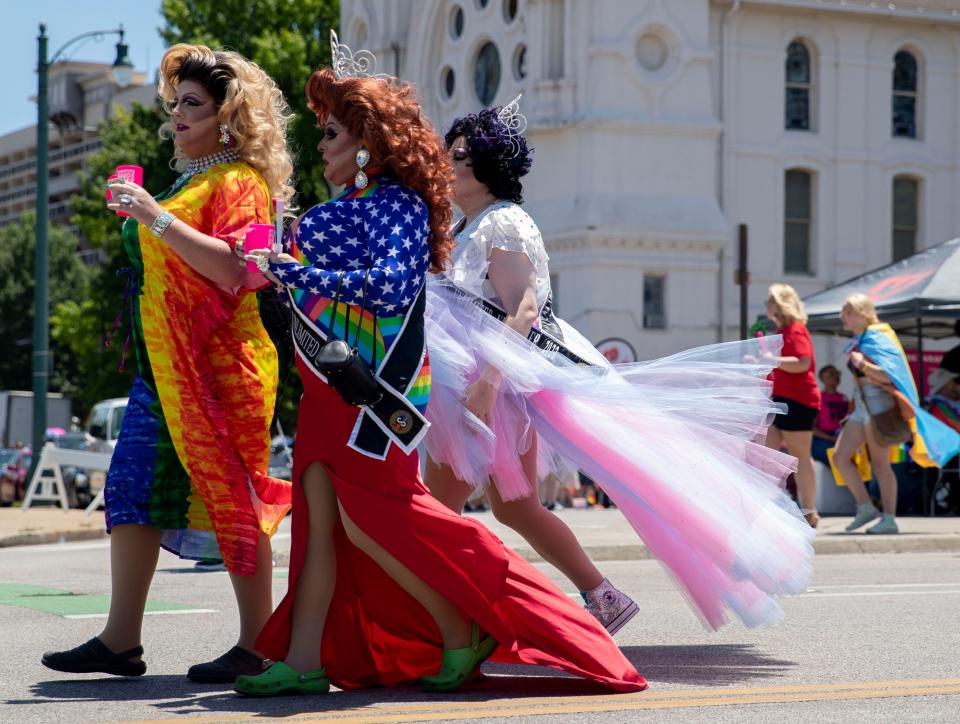Federal judge tosses Tennessee's controversial anti-drag law, declares it unconstitutional
In a significant win for LGBTQ advocates, a federal judge has tossed out Tennessee's controversial law restricting drag performances, after hearings in which the law's necessity and broad language were questioned.
Judge Thomas Parker issued his ruling just after midnight Friday, writing that, "the Court finds that — despiteTennessee’s compelling interest in protecting the psychological and physical wellbeing of children — the Adult Entertainment Act (“AEA”) is an UNCONSTITUTIONAL (sic) restriction on the freedom of speech."
Initially, the lawsuit named Tennessee Gov. Bill Lee, State Attorney General Jonathan Skrmetti and Shelby County District Attorney General Steve Mulroy in his capacity as the ban's enforcer in Shelby County.
Both Lee and Skrmetti's names were removed from the lawsuit, but that doesn't mean the ruling won't impact the rest of the state. Because the state's attorney general cannot enforce the law in Shelby County, any subsequent attempts to enforce the ban in other parts of the state would likely be immediately and successfully challenged in court, attorneys said.

More: Attorneys finish arguments over Tennessee drag show ban, federal judge set to rule
On Saturday Skrmetti indicated via a statement that he planned to appeal, and that he still considers the law to be in effect throughout the state's other 94 counties despite it being ruled unconstitutional.
“The scope of this law has been misrepresented in public by those more interested in pressing a narrative than in reading the statutory text," his statement read. "The Adult Entertainment Act remains in effect outside of Shelby County. This narrowly-tailored law protects minors from exposure to sexually explicit performances. Its operative language is rooted in the U.S. Supreme Court’s long-established First Amendment precedent. We are reviewing the order and expect to appeal at the appropriate time.”
The bill restricting "male and female impersonators" from performing in public spaces was signed into law by Gov. Bill Lee at the start of March. The bill was one of several to come out of the 2023 legislative session that was said to target LGBTQ Tennesseans.
By late March, a Memphis-based theater group, Friends of George's, filed suit against the state. The group wrote on its website in March that the bill imperils the lives of "drag performers and seeks to oppress queer culture state-wide."
“This win represents a triumph over hate,” Friends of George’s in a statement Saturday. “Our first amendment rights were affirmed today as drag artists and makers of theatre. Similar to the countless battles the LGBTQ+ community has faced over the last several decades, our collective success relies upon everyone speaking out and taking a stand against bigotry.”
Micah Winter, a member of Friends of George's and a well-known drag queen who performs under the name Goldie Dee in Memphis, called the decision "surreal," as it came with just hours to spare before the start of Mid-South Pride's festival and parade down Beale Street.
"We are nervous about the reception we will get from people not in our community, but we are thrilled to embrace our community today in a pinnacle moment for drag and queer people in Memphis, and Tennessee at large," Winter said.
Mark Campbell, aka Camille Collins, a resident company member and president of Friends of George’s, said the nonprofit, “Chose to take a stand against bigotry to defend drag artistry and our right to creative expression.”
“The stage should remain a sacred platform where actors and performers can inspire others in a shared space,” Campbell said. “Our country is built on the bedrock of free speech, and the court affirmed this right through today's decision. We will keep advocating for our fellow drag performers and for the well-being of the entire LGBTQ+ community."
Defense attorneys for the state focused on why the law was necessary to protect any minors who may be exposed to indecency. But, Parker questioned the necessity of the bill, noting Tennessee already had thorough laws on the books that banned obscenity.
In the initial filing, the lawsuit noted "drag" is an umbrella term that encompasses endless forms of the performance style. The ban, as it was written, could have unwittingly attached felony consequences to any show featuring "male or female impersonators," like a theater production of "Mrs. Doubtfire," for example.
In court, Parker expressed concern that the felony component of the law could mean an individual's loss of voting rights based on one person's opinion of what is, or isn't, appropriate.
Parker's opinion comes before a wide range of events for Pride month across Tennessee in both metro areas and rural counties, including Mid-South Pride's yearly Pride festival in Memphis and the Franklin Pride Festival in Middle Tennessee.
Regina Hillman, a member of the legal team that argued Obergefell v Hodges — the case that brought marriage equality before the U.S. Supreme Court — said Parker's opinion was "excellent" and would be applicable statewide.
"It's a big win," Hillman said. "And I think we all expected that the ban would be found unconstitutional."
Micaela Watts is a reporter for The Commercial Appeal, covering issues tied to education, access, and equity. She can be reached at micaela.watts@commercialappeal.com.
Commercial Appeal reporter Omer Yusuf and Tennessean reporter Angele Latham contributed to this report.
This article originally appeared on Memphis Commercial Appeal: Tennessee anti-drag law struck down by federal judge

